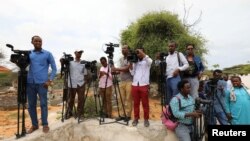Somalia is one of the lowest-ranked countries in Africa for press freedom, and advocates are calling on authorities to do more to support journalists as the Horn of Africa nation looks ahead to elections.
Over the past four months in Somalia, authorities have raided three media houses and arrested some 30 journalists.
In March, police shot and wounded two Mogadishu journalists and others who were on assignment.
According to the Somali Journalists Syndicate, a Mogadishu-based media advocacy group, all of these acts were perpetrated by Somali government state security agencies such as the National Intelligence and Security Agency (NISA) and police.
Bashir Mohamud Yusuf, who is the editor of Mustaqbal radio, says he sustained injuries and that his equipment was confiscated after police raided his station in the capital on April 27.
He says the special police broke into the premises and ordered the media workers to surrender before torturing them. He added that the security agencies seized the station’s equipment, including laptops, which have yet to be returned.
Somalia has long maintained its unenviable title as one of the most dangerous countries in the world to practice journalism. In March, al-Shabab militants claimed responsibility for the death of a journalist who was attacked in his Galkayo home.
But other factors, such as a deadlock over how to hold still unscheduled elections, have increased threats against the journalists.
“The attacks and threats against journalists are on the rise in what we believe is due to the ongoing stalemate on the elections and the critical transitional which Somalia is in now,” said Abdalla Mumin, secretary-general of Somali Journalists Syndicate.
Mumin says Somali authorities also manipulate Facebook into blocking critical reports online through the use of hired trolls.
“We are also concerned about the use of Facebook’s content management system called community standards, which they use as an excuse to block and censure independent and critical reporting by the Somali journalists and the local media houses," he said. "This issue is affecting journalists because whenever journalists report something on Facebook on other social media platforms, government trolls who are on standby usually attack by reporting this content, and [the] content ends up being censored or deleted from the social media.”
A statement by the office of Prime Minister Mohamed Hussein Roble, issued on World Press Freedom Day, said his administration is working hard to improve the working environment of Somali journalists by giving them access to government information while working to ensure their safety.
He also urged the media to refrain from reporting unverified and unreliable information, saying Somali media should be contributing to the peacebuilding of the country and not resorting to the incitement of election-related violence.




